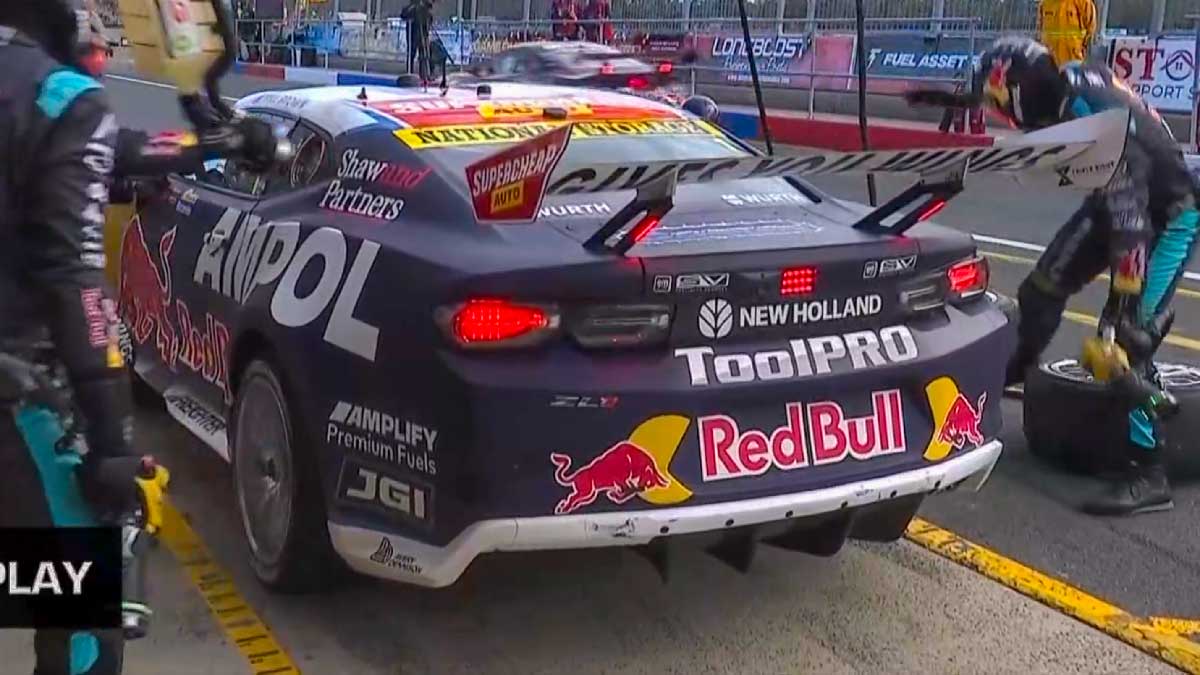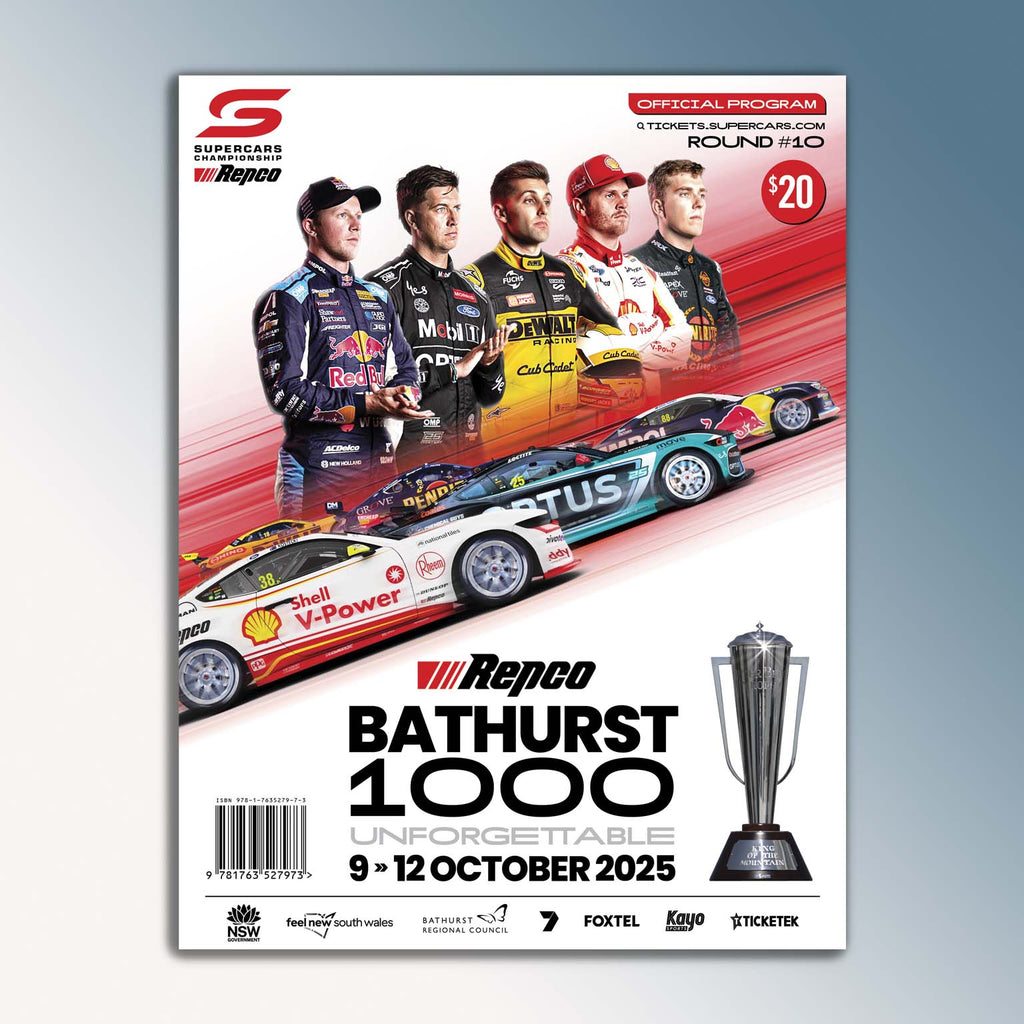MOTORSPORT Australia’s stewards have explained why Will Brown received a penalty for having his car’s wheels spinning during a pitstop in Sunday’s Supercars race at Queensland Raceway.
The television coverage showed the #1 Camaro’s rear wheels spinning before being dropped off the jacks during its second pitstop, a breach of Supercars rule D11.8.9.
That rule says: “During any Pit Stop, from the time the Car leaves the ground until the Car has returned to the ground, the brake lock mechanism must be engaged, so as the rear wheels do not rotate without the prior approval of the (General Manager of Motorsport).”
The stewards elected to investigate the matter after the race and handed Brown a 15-second time penalty.
That dropped him from 18th past the flag to 23rd in the final results once multiple post-race time penalties were applied to drivers throughout the field. The position drop also cost Brown 12 championship points.
It’s the second round in a row where Triple Eight has fronted the stewards over spinning wheels during a pitstop for Brown’s car.
In Townsville, the team was cleared of a rule breach due to an anomaly that caused the wheels to spin despite the car’s linelocker being engaged.
The linelocker was once again engaged during the contentious stop at QR, when the wheels spun again.
This time around, the stewards elected to award a penalty after determining that Triple Eight didn’t comply with their obligations around preventing the wheels from spinning.
“The fact that the Car’s rear wheels were rotating while the Car before it returned to the ground during the relevant Pit Stop was not in dispute,” the stewards report said.
“It was also not in dispute that the brake lock mechanism was engaged, and the rear brake pressure exceeded the prescribed minimum of 20 bar.
“The question for the Stewards was as to how Rule D11.8.9 operates and what obligations it imposes on the relevant parties.
“In the Stewards’ view, the critical words in the Rule are “so as the rear wheels do not rotate without the prior approval of the GMM”.
Based on the evidence presented by Triple Eight and Supercars’ personnel, the stewards felt the team ticked two boxes – the linelocker was engaged and applied more than the minimum amount of pressure – but that it failed to tick the third box by engaging in a way that stopped the wheels from turning.
The stewards also explained why they elected to award Brown a time penalty, after Triple Eight argued that it was a team breach – which would incur a fine – rather than a driving breach.
“The Stewards impose a 15 second Time Penalty because a sporting penalty is appropriate as the action of the Driver was the primary cause for the wheels to rotate and consider that a sporting penalty rather than a monetary penalty is the appropriate penalty in the circumstances,” the stewards said.
Read the full MA Stewards Decision below:
The Stewards, having received a report from the Deputy Race Director, determine the following:
Car and Driver: Car 1 Will Brown
Competitor: Triple Eight Race Engineering Australia Pty Ltd
Date: Sunday, 10 August 2025
Session: Race 25
Fact: During a Pit Stop of Car 1 in Race 25 the rear wheels of the Car were observed to be spinning before the Car returned to the ground.
Rule: D11.8.9 During any Pit Stop, from the time the Car leaves the ground until the Car has returned to the ground, the brake lock mechanism must be engaged, so as the rear wheels do not rotate without the prior approval of the GMM.
Decision: A 15 second post-race Time Penalty for Car 1 in Race 25.
Reason: The Stewards summonsed and heard from the Competitor’s Authorised Representative. The Stewards also heard from the DRD, the GMM and Supercar’s Category Technical Manager.
The fact that the Car’s rear wheels were rotating while the Car before it returned to the ground during the relevant Pit Stop was not in dispute. It was also not in dispute that the brake lock mechanism was engaged, and the rear brake pressure exceeded the prescribed minimum of 20 bar. The question for the Stewards was as to how Rule D11.8.9 operates and what obligations it imposes on the relevant parties.
The issue is whether the obligation on the Competitor and/or Driver was only to engage the brake lock mechanism to a pressure exceeding 20 bar or whether the obligation was to engage the brake lock mechanism to the pressure of at least 20 bar AND in a way to prevent the wheels rotating before the Car returned to the ground.
In the Stewards’ view, the critical words in the Rule are “so as the rear wheels do not rotate without the prior approval of the GMM”. Those words proscribe the way in which the lock mechanism must be engage, or in other words, what the Competitor/Driver must achieve by the engagement of the brake lock mechanism.
Therefore, the obligation on the Competitor/Driver is:
1) To engage the brake lock mechanism;
2) Engage it to a pressure of at least 20 bar; and
3) Engage it such a way that “the rear wheels do not rotate without the prior approval of the GMM”.
Here the Competitor/Driver complied with the first 2 elements but not the third and therefore the breach of the Rule is established.
The Stewards also heard from the DRD and the Competitor’s Authorised Representative in relation to the appropriate penalty to be imposed. The DRD submitted that a time penalty is the appropriate penalty to be imposed.
The Competitor’s Authorised Representative submitted that this was a Team breach for failing to provide the Driver with sufficient information and submitted that a fine would be the appropriate penalty.
The Stewards impose a 15 second Time Penalty because a sporting penalty is appropriate as the action of the Driver was the primary cause for the wheels to rotate and consider that a sporting penalty rather than a monetary penalty is the appropriate penalty in the circumstances.
The Competitor is reminded that Decisions and Penalties that may be subject to Appeal are set out in B7.7.2 and the Rights to and process for an Appeal are set out in B5.


